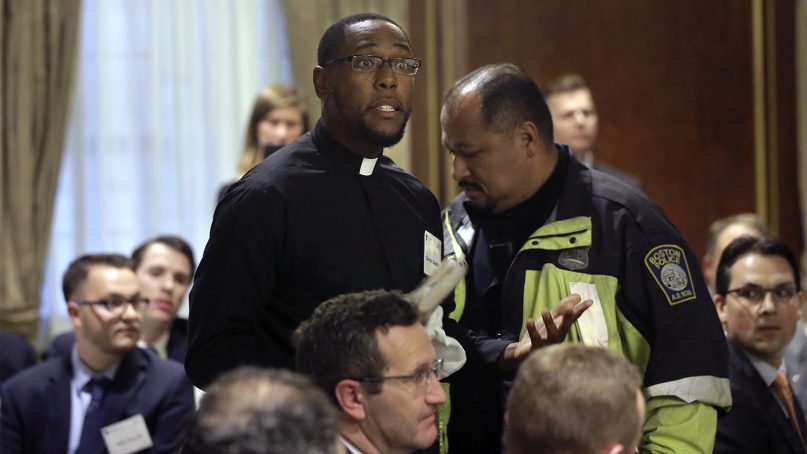(RNS) — Attorney General Jeff Sessions was only moments into a speech on religious liberty Monday (Oct. 29) before he was interrupted by two ministers who called on him to “repent” for his role in enforcing Trump administration policy.
Sessions was speaking about “The Future of Religious Liberty” at a meeting in Boston hosted by the Boston Lawyers Chapter of the Federalist Society, a conservative legal group. But as soon as he began his remarks, a United Methodist minister, the Rev. Will Green of Ballard Vale United Church in Andover, Mass., began reciting Scripture.
“Remember the words of Jesus: I was hungry and you did not feed me. I was a stranger, and you did not welcome me,” Green began, standing as he recited other parts of Matthew 25. He then referenced the attorney general’s Christian denomination: “Brother Jeff, as a fellow United Methodist, I call upon you to repent, to care for those in need, to remember that when you do not care for others, you are wounding the body of Christ.”
Religious leaders interrupt Attorney General Jeff Sessions' speech: "Brother Jeff, as a fellow United Methodist I call upon you to repent, to care for those in need."
Sessions: "Well, thank you for those remarks and attack but I would just tell you we do our best everyday" pic.twitter.com/NUq5HSZZMg
— ABC News Politics (@ABCPolitics) October 29, 2018
Sessions thanked Green for his comments, then referred to the pastor’s remarks as an “attack,” as Green was removed from the meeting by police.
“I will just tell you we do our best every day to fulfill my responsibility to enforce the laws of the United States,” Sessions said.
Green later told Religion News Service that he understood why Sessions described his remarks, which were primarily a recitation of Scripture, as an attack.
“Sometimes when we encounter Jesus it does feel like we are being attacked,” he said, “because when we encounter (it) we can see clearly that what we are doing on this earth is an obstacle to Jesus.”
A local chapter of Faith in Action, which organizes faith communities for various causes, later tweeted that Green worked with the group. Green noted in the interview with RNS that his protest was mirrored by a larger demonstration outside the building. He said concerns about Sessions’ posture on immigrants and refugees — as well as other Department of Justice policies — fueled his protest.
“I interrupted Attorney General Sessions today because his entire political agenda is antithetical to the gospel of Jesus Christ,” he said. “Brother Jeff and I are members of the United Methodist Church, so I think I have a responsibility to call him to account about the harm he’s doing.”
He explained that he saw his protest “in the Methodist, Wesleyan tradition as an expression of social holiness.”
Jeff Sessions responds to protesters: "I don't believe there's anything in my theology that says a secular nationstate cannot have lawful laws to control immigration … not immoral, not indecent and not unkind to state what your laws are and then set about to enforce them" pic.twitter.com/oGjtMM67ru
— ABC News Politics (@ABCPolitics) October 29, 2018
Green’s protest at the event was immediately followed by another from the Rev. Darrell Hamilton of First Baptist Church in Jamaica Plain, Mass., who also stood up and raised his voice over boos and shouts of “go home!” from others in the room.
Hamilton told Sessions and the crowd that Green was simply exercising his right to freedom of religion.
“That is a person that represents the Christian tradition,” he said, “the faith that everyone here professes to believe in, actually sharing the words of Jesus himself.”
As Hamilton was also led out by police, he identified himself as a Baptist pastor and said it was hypocritical for a group that supports religious freedom to have him escorted from the room for practicing his faith.
Sessions then defended the nation’s immigration policies, saying that they are compatible with his faith and that it is “not immoral, not indecent and not unkind to state what your laws are and then set about to enforce them.”
Later, Hamilton explained protest as a part of a Baptist tradition.
“Jeff Sessions is not a champion of true religious liberty,” he said in an email. “And as a Baptist preacher, in the long legacy of Baptist preachers such as Roger Williams and John Leland, I disrupted Jeff Sessions to defend the protection of both soul and religious freedom of all people as a true witness of Christian religion practice.”
Green said he understood why he and Hamilton were removed from the room. But he echoed Hamilton’s broader remarks about religious liberty and protest.
“You really can’t do religious liberty without taking into account how people practice their religion, which includes social witness and social action,” he said.
Monday’s protest was far from Sessions’ first run-in with faith leaders frustrated by actions he has taken as attorney general. When Sessions cited the Bible to justify enforcement of a policy that separated families crossing the U.S.-Mexico border, a number of faith communities issued statements condemning both the policy and his use of Scripture.
In June, more than 600 of his fellow Methodists filed a church complaint against him, railing against his “zero-tolerance” policy at the border and accusing him of child abuse, immorality, racial discrimination and “dissemination of doctrines contrary to the standards of doctrine of the United Methodist Church.”
The complaint was eventually tossed out by regional church officials in Alabama on a technicality, although the logic of the dismissal sparked confusion and derision from numerous Methodist leaders — including a former president of the UMC’s Judicial Council.
Leaders within the UMC and other mainline Christian traditions have been critical of Sessions and President Trump, but members of their churches are roughly split in their support for the president. According to a March Pew Research poll, 46 percent of white mainline Protestants disapproved of Trump, but 48 percent approved.





